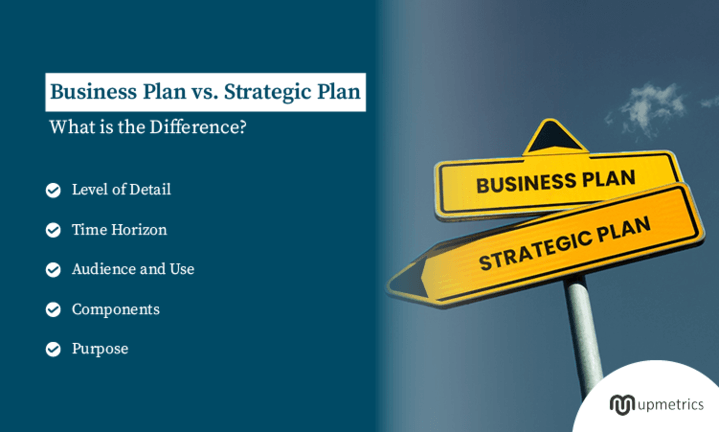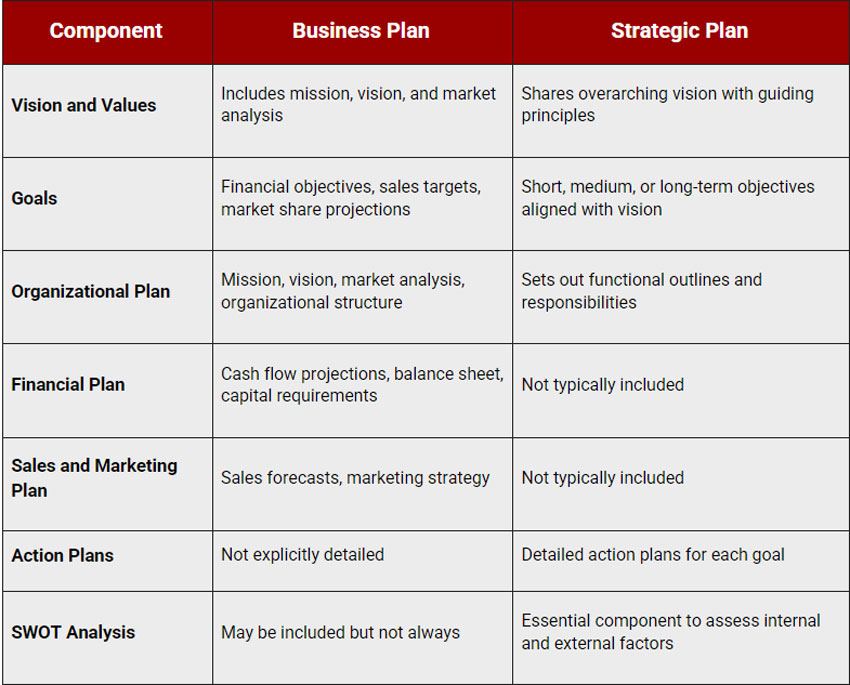Looking for AI in local government? See our newest product, Madison AI.

More Like this
What is the difference between a business plan and a strategic plan.
It is not uncommon that the terms ‘strategic plan’ and ‘business plan’ get confused in the business world. While a strategic plan is a type of business plan, there are several important distinctions between the two types that are worth noting. Before beginning your strategic planning process or strategy implementation, look at the article below to learn the key difference between a business vs strategic plan and how each are important to your organization.
Definition of a business plan vs. a strategic plan
A strategic plan is essential for already established organizations looking for a way to manage and implement their strategic direction and future growth. Strategic planning is future-focused and serves as a roadmap to outline where the organization is going over the next 3-5 years (or more) and the steps it will take to get there.
Get the Free Guide for Setting OKRs that Work (with 100 examples!)
A strategic plan serves 6 functions for an organization that is striving to reach the next level of their growth:.
- Defines the purpose of the organization.
- Builds on an organization’s competitive advantages.
- Communicates the strategy to the staff.
- Prioritizes the financial needs of the organization.
- Directs the team to move from plan to action.
- Creates long-term sustainability and growth impact
Alternatively, a business plan is used by new businesses or organizations trying to get off the ground. The fundamentals of a business plan focus on setting the foundation for the business or organization. While it looks towards the future, the focus is set more on the immediate future (>1 year). Some of the functions of a business plan may overlap with a strategic plan. However, the focus and intentions diverge in a few key areas.
A business plan for new businesses, projects, or organizations serves these 5 functions:
- Simplifies or explains the objectives and goals of your organization.
- Coordinates human resource management and determines operational requirements.
- Secures funding for your organization.
- Evaluates potential business prospects.
- Creates a framework for conceptualizing ideas.
In other words, a strategic plan is utilized to direct the momentum and growth of an established company or organization. In contrast, a business plan is meant to set the foundation of a newly (or not quite) developed company by setting up its operational teams, strategizing ways to enter a new market, and obtaining funding.
A strategic plan focuses on long-term growth and the organization’s impact on the market and its customers. Meanwhile, a business plan must focus more on the short-term, day-to-day operational functions. Often, new businesses don’t have the capacity or resources to create a strategic plan, though developing a business plan with strategy elements is never a bad idea.
Business and strategic plans ultimately differ in several key areas–timeframe, target audience, focus, resource allocation, nature, and scalability.
While both a strategic and business plan is forward-facing and focused on future success, a business plan is focused on the more immediate future. A business plan normally looks ahead no further than one year. A business plan is set up to measure success within a 3- to 12-month timeframe and determines what steps a business owner needs to take now to succeed.
A strategic plan generally covers the organizational plan over 3 to 5+ years. It is set with future expansion and development in mind and sets up roadmaps for how the organization will reach its desired future state.
Pro Tip: While a vision statement could benefit a business plan, it is essential to a strategic plan.
Target Audience
A strategic plan is for established companies, businesses, organizations, and owners serious about growing their organizations. A strategic plan communicates the organization’s direction to the staff and stakeholders. The strategic plan is communicated to the essential change makers in the organization who will have a hand in making the progress happen.
A business plan could be for new businesses and entrepreneurs who are start-ups. The target audience for the business plan could also be stakeholders, partners, or investors. However, a business plan generally presents the entrepreneur’s ideas to a bank. It is meant to get the necessary people onboard to obtain the funding needed for the project.
A strategic plan provides focus, direction, and action to move the organization from where they are now to where they want to go. A strategic plan may consist of several months of studies, analyses, and other processes to gauge an organization’s current state. The strategy officers may conduct an internal and external analysis, determine competitive advantages, and create a strategy roadmap. They may take the time to redefine their mission, vision, and values statements.
Alternatively, a business plan provides a structure for ideas to define the business initially. It maps out the more tactical beginning stages of the plan.
Pro Tip: A mission statement is useful for business and strategic plans as it helps further define the enterprise’s value and purpose. If an organization never set its mission statement at the beginning stages of its business plan, it can create one for its strategic plan.
A strategic plan is critical to prioritizing resources (time, money, and people) to grow the revenue and increase the return on investment. The strategic plan may start with reallocating current financial resources already being utilized more strategically.
A business plan will focus on the resources the business still needs to obtain, such as vendors, investors, staff, and funding. A business plan is critical if new companies seek funding from banks or investors. It will add accountability and transparency for the organization and tell the funding channels how they plan to grow their business operations and ROI in the first year of the business.
The scalability of a business plan vs. strategic plan
Another way to grasp the difference is by understanding the difference in ‘scale’ between strategic and business plans. Larger organizations with multiple business units and a wide variety of products frequently start their annual planning process with a corporate-driven strategic plan. It is often followed by departmental and marketing plans that work from the Strategic Plan.
Smaller and start-up companies typically use only a business plan to develop all aspects of operations of the business on paper, obtain funding and then start the business.
Why understanding the differences between a business plan vs a strategic plan matters
It is important to know the key differences between the two terms, despite often being used interchangeably. But here’s a simple final explanation:
A business plan explains how a new business will get off the ground. A strategic plan answers where an established organization is going in the future and how they intend to reach that future state.
A strategic plan also focuses on building a sustainable competitive advantage and is futuristic. A business plan is used to assess the viability of a business opportunity and is more tactical.
10 Comments
I agree with your analysis about small companies, but they should do a strategic plan. Just check out how many of the INC 500 companies have an active strategic planning process and they started small. Its about 78%,
Strategic management is a key role of any organization even if belong to small business. it help in growth and also to steam line your values. im agree with kristin.
I agree with what you said, without strategic planning no organization can survive whether it is big or small. Without a clear strategic plan, it is like walking in the darkness.. Best Regards..
Vision, Mission in Business Plan VS Strategic Plan ?
you made a good analysis on strategic plan and Business plan the difference is quite clear now. But on the other hand, it seems that strategic plan and strategic management are similar which I think not correct. Please can you tell us the difference between these two?. Thanks
Thank you. I get points to work on it
super answer Thanking you
Hi. I went through all the discussions, comments and replies. Thanks! I got a very preliminary idea about functions and necessity of Strategic Planning in Business. But currently I am looking for a brief nice, flowery, juicy definition of “Business Strategic Planning” as a whole, which will give anyone a fun and interesting way to understand. Can anyone help me out please? Awaiting replies…… 🙂
that was easy to understand,
Developing a strategic plan either big or small company or organization mostly can’t achieve its goal. A strategic plan or formulation is the first stage of the strategic management plan, therefore, we should be encouraged to develop a strategic management plan. We can develop the best strategic plan but without a clear plan of implementation and evaluation, it will be difficult to achieve goals.
Comments Cancel
Join 60,000 other leaders engaged in transforming their organizations., subscribe to get the latest agile strategy best practices, free guides, case studies, and videos in your inbox every week..

Leading strategy? Join our FREE community.
Become a member of the chief strategy officer collaborative..

Free monthly sessions and exclusive content.
Do you want to 2x your impact.
Business Plan Vs Strategic Plan: What’s the Difference?

Business Plan Template
- May 6, 2024

Strategic and business plans are both different sides of the same coin! Some entrepreneurs use it interchangeably but they have a significant difference.
Now the question might arise, when to use which, and what is the difference, right?
Worry not—we’re here to guide you through it all. In this article, we’ll learn the differences between a business and a strategic plan, understand their meanings, and know how to use them effectively.
So, let’s kick-start this journey by exploring a business plan vs. strategic plan . Get ready to unlock everything about both!
What is a Business Plan?
A business plan is a written document that outlines a company’s goals, timeline, finances, and strategies for achieving them. It provides a roadmap for the future of your business.
Generally, it includes sections such as an executive summary, company description, market analysis, products & services, financial plan, and much more. Your business plan is a must-have document when it comes to securing funds for your business.
Okay! And what about the strategic plan?
What is a Strategic Plan?
A strategic plan is a document that communicates an organization’s vision, mission, and core values. It focuses more on specifics about how a business will operate and generate profits.
Strategic plans are typically long-term documents, covering a period of three to five years or more, and are used to guide decision-making and resource allocation within the organization.
Key Difference Between a Business Plan and Strategic Plan
It was all about the basic definition of business and strategic plan. Now, let’s compare them side-by-side to understand their use case, and how they are distinct from each other:
Level of detail
A business plan is usually considered a granular and in-depth document. It outlines the tactics and actions necessary to achieve operational objectives. Business plans are usually 15-30 pages long .
A strategic plan typically provides a high-level overview of the organization’s goals and the strategies to achieve them without going deep into the business operations. Strategic plans are generally 10-15 pages long, but the length depends on various factors of the business.
Time horizon
A business plan focuses on a shorter time frame, often one to three years, and is more operational. It focuses on things like product development, marketing strategies, financial projections, etc.
A strategic plan answers the questions related to a longer time frame, usually five or more years. It sets the direction of the company for the future by mentioning the mission, vision, and objectives.
Audience and use
A business plan is primarily used to attract investors, bankers, or partners for securing funding or partnership.
Whereas, internal members, such as senior management or a board of directors, use a strategic plan to guide decision-making.
A business plan explains all the sections like market analysis, products & services, management team, target market, sales & marketing strategies, financial projections, and more.
While a strategic plan has a vision statement, mission statement, core values, action plans, and more. Some of the strategic planning models are SWOT analysis , PESTLE (political, economic, social, technological, legal, and environmental) analysis, Porter’s five forces, and more.
Entrepreneurs and startups use business plans to create a strategy to build a successful business. It is used for assessing how marketable a business idea is and also helps them gauge how they can get the funding to turn this idea into reality.
Established companies use the strategic plan to give them a clear direction for where they want the company to change or develop.
For instance, decisions like changing the products they provide or moving into a nonprofit can be made with the help of a strategic plan.
Create winning business and strategic plans with our
AI Business Plan Generator
Plans starting from $7/month

Now that we know the key differences between strategic and business planning, let us understand the common pitfalls.
Common Pitfalls in Execution
Despite the benefits of business planning as well as the strategic planning process , organizations often face many challenges in their strategy implementation. Here are some common pitfalls:
Disparity between strategy and execution: Without effective execution, even the strategic plan that is the most well-crafted may fail to give results.
Lack of alignment: Failure to align the business plan with strategic objectives often results in missed opportunities and misallocation of resources.
Inadequate marketing analysis: Insufficient analysis of external factors leads to missed opportunities or strategic blind spots that can cause more harm to a company.
To overcome these challenges, organizations need to foster a culture of communication, continuous improvement, and collaboration.
The Bottom Line
There is no one-fits-all solution when it comes to this decision! Choosing between a business and a strategic plan solely depends on the needs & objectives of your business.
Moreover, know this planning is not a one-time process! As your business evolves and external factors change, you will need to revise your plans accordingly.
A business and a strategic plan are crucial for guiding any organization to success. By using both methods effectively, businesses can navigate uncertainties, achieve steady growth, and grab opportunities in a constantly changing business world.
Build your Business Plan Faster
with step-by-step Guidance & AI Assistance.
Frequently Asked Questions
Which comes first, strategy or business plan.
Before making a business plan, you should create a strategic plan. A business should know all its long-term growth goals before actually defining how to reach them.
So, first, create a strategic plan, then a business plan, and then edit both of them when needed according to the circumstances.
Can a business plan be used for a strategic plan?
No, both are different. While a business plan details the operational and financial aspects of a business, a strategic plan defines goals and the strategies to achieve them. Therefore, serving different purposes, a business plan can not be used to make a strategic plan.
Is there a sample business plan or strategic plan template available online?
Yes, there are many sample business plans and strategic plan templates available online. You can find such templates on:
- Upmetrics – An AI-powered business plan software
- Small Business Administration Website
- SCORE business plans
Do I need both a business and strategic plan?
Yes, both a business plan and a strategic plan are essential for a company’s growth. A business plan focuses on the initial stages of a business, aiming to get it started. In contrast, a strategic plan focuses on the business’s distant goals and strategies to achieve them.
About the Author
Upmetrics Team
Upmetrics is the #1 business planning software that helps entrepreneurs and business owners create investment-ready business plans using AI. We regularly share business planning insights on our blog. Check out the Upmetrics blog for such interesting reads. Read more
Get started with Upmetrics Al
- 400+ sample business plans
- Al-powered financial planning
- Collaborative workspace
Reach Your Goals with Accurate Planning

- Certifications
- Associate Business Strategy Professional
- Senior Business Strategy Professional
- Examination
- Partnership
- For Academic Affiliation
- For Training Companies
- For Corporates
- Help Center
- Associate Business Strategy Professional (ABSP™)
- Senior Business Strategy Professional (SBSP™)
- Certification Process
- TSI Certification Examination
- Get your Institution TSI Affiliated
- Become a Corporate Education Partner
- Become a Strategy Educator
- Frequently Asked Questions
Business plan vs Strategic Plan - What You Must Know

Like everything else in life, the nature of business needs a plan in place to follow and measure. Crafting a strategic roadmap isn't just a suggestion—it's a necessity.
This is one of the key elements of a startup or even a business division within an organization that is expanding or diversifying. It has every resource element and needs to be mapped out for the business, including projected milestones for the future.
However, every business strategist needs to know that there are some subtle differences between what constitutes a business plan, and the several differences it has with a strategic plan. Let’s walk through the different elements that comprise each and understand the outcome each aims to achieve.
Introducing The Business Plan
A business plan is exactly what the name suggests— a plan to start and run a business or a new entity of an existing business; usually either an expansion in a newer region or a diversification into a new market. Business plans are mainly created for internal reference purposes or external funding purposes, with the latter being the common usage. They form the basis of all business strategies and decisions made at the ownership level in an organization. The most essential components of a business plan include:
Organizational Plan - This is the core of a business plan, and it includes the mission and vision statement, along with the market in which the company plans to operate. This plan also encompasses thorough market research to gauge the potential of the business, crucial for securing funding or sponsorship. It articulates the rationale behind the business's growth trajectory, outlining clear timelines for achieving milestones along the way.
Financial Plan - A robust financial plan is the bedrock of any successful business venture, where cash flow reigns supreme, and a meticulously crafted balance sheet serves as the ultimate scorecard. A financial plan includes some of the most important elements of the entire business plan and includes elements like projected cash flow statements, capital requirements, a summary of projected overheads, a projected balance sheet including assets and liabilities, and income and expense statements.
Remember to regard this as the central nervous system, for it permeates and influences almost every aspiration the enterprise hopes to attain.
Sales and Marketing Plan - We mentioned “almost” everything above for this very reason. Sales and marketing form the other significant component of the business plan. These include sales forecasts and overheads, marketing and brand management summaries, and market share projections that the business hopes to achieve within a time frame.
Business plans are indeed comprehensive and all-encompassing. They form the basis of the business's existence or the rationale for investments in it. But what about translating these plans into action? How do we ensure that the sky-high goals set forth are actually achievable?
The Actionables- A Strategic Plan
Strategic plans constitute the basis of operations and responsibilities within the business. These plans lay the paths out for each member of the organization to follow and define the functional outline and the key outcomes for every project and process within the business. A strategic plan goes on to define the operations and their outcomes within the organization, its departments, and its employees. The single thread connecting strategic planning with the business plan is the vision of the organization, and for obvious reasons— vision serves as the guiding light for strategy formation, which, in turn, directs the day-to-day operations of the business.
Why A Strategic Plan is Crucial to The Organization
In a word— synchronization. A robust and well-laid-out strategic plan establishes the much-needed sync between teams and their objectives. Not only that, it also provides a guide for daily operations alongside the focus and direction that teams often need to get the job done, on time and within budget. When all these components are integrated into a cohesive network, the true value of a strategic plan emerges—a seamless and grand orchestration of departments, teams, and individuals using the resources allocated to them to achieve the key performance indicator that they are responsible for.
Elements to Consider in a Strategic Plan
When tasked with creating a strategic plan for your business, you will need to incorporate certain components that will ensure that the stakeholders are aligned completely with the organization’s goals and objectives. These include:
Vision and Values - The vision statement is the most important component of the strategic plan and the most overarching. It propels the organization towards established goals and the values that every employee and stakeholder must incorporate.
Goals - These are short, medium, or long-term, depending on the scope of the strategic plan. They provide the much-needed context for the organization to undertake initiatives that meet the vision while maintaining the values.
Guiding Principles - Often, organizations face crossroads where they must decide which steps to take next, to reach their vision. Principles are included in strategic plans to align teams towards the vision when faced with a dilemma and form a critical part of strategic planning.
Action Plans - A sum of key initiatives, processes, and projects that are required to be performed on a pre-determined periodic basis for the goal to be accomplished. These also include the time frames for each stakeholder responsible for each option. They usually follow the DACI format for each action (Driver, Approver, Contributor, Informed)
SWOT Analysis - The quintessential component, the Strength, Weaknesses, Opportunities, and Threats analysis of the strategic plan lends context to all business actions vis-a-vis the external environment. This includes competitors, market forces and conditions, identification of internal and external threats, and several other factors.
Read This - SWOT Analysis: How to Strengthen Your Business Plan
Here’s a table highlighting the main differences between a Business Plan and a Strategic Plan with a focus on the key components of each—

Learning All About Strategic Planning
In all businesses, a strategic plan serves as the foundational blueprint, akin to a meticulously drawn map for a general. It provides the essential guidance and direction needed for the entire organization to navigate toward success. It is crucial, therefore, to acquire the necessary skills and certifications for employment as a business strategist who would be entrusted with creating it. Know more about how to become a successful and sought-after business strategist today!

Recent Posts


How Data Analytics Can Revolutionize Your Business - A Strategist's Guide
Download this Strategist's Guide to empower yourself with resourceful insights:
- Roadblocks to Data Usage
- Advantages that Data Analytics offer for businesses
- Elements of a Data Analytics Strategy
- Top reasons why businesses must adopt a Data Analytics Strategy
- Case studies, Scenarios, and more

CredBadge™ is a proprietary, secure, digital badging platform that provides for seamless authentication and verification of credentials across digital media worldwide.
CredBadge™ powered credentials ensure that professionals can showcase and verify their qualifications and credentials across all digital platforms, and at any time, across the planet.

Verify A Credential
Please enter the License Number/Unique Credential Code of the certificant. Results will be displayed if the person holds an active credential from TSI.
Stay Informed!
Keep yourself informed on the latest updates and information about business strategy by subscribing to our newsletter.
Start Your Journey with The Strategy Institute by Creating Your myTSI Account Today.
- Manage your professional profile conveniently.
- Manage your credentials anytime.
- Share your experiences and ideas with The Strategy Institute.
Account Login
- Remember Password
- Forgot Password?
Forgot Password
The magazine of Glion Institute of Higher Education
- Strategic planning vs business planning: how they’re both key to success

Any thriving hospitality business needs thorough planning to make sure it succeeds. If you’ve heard the terms business planning and strategic planning, you might think they’re interchangeable, but they’re actually two distinct things companies need at different times for continued success.
The biggest difference is that business plans are mostly used when you are starting to build a business so you can quickly and smoothly create your vision. Strategic planning is what existing companies use to grow and improve their businesses.
If you’re looking for a career in hospitality management, it’s important to know the difference between the two and how to use them to best effect. In this article, we’ll go over what strategic planning and business planning are and how they are important to running a successful hospitality business.
We’ll also look at how you can learn to harness different planning methods and get the skills needed to develop your career.
Business planning
A business plan is one of the first things a fledgling business will draft. Alternatively, it can be used to set business goals when launching a new product or service.
The business plan will usually look at short-term details and focus on how things should run for around a year or less. This will include looking at concepts such as:
- What the business idea is
- Short-term goals
- Who your customers are
- What your customers need
- What investment or financing you will need to start your business
- How you make revenue
- What profitability to expect
- How you can appeal to potential shareholders
- What the short-term operational needs of the business are
- What the company’s values are
- What the budget is for different parts of the business
This means market analysis and research are vital when you are making a business plan.
What are the objectives of business planning?
The primary objective of a business plan is to have all the main details of your business worked out before you start. This will give you a roadmap to use when you launch your business or when you start offering a different product or service.
For example, if you wanted to become an event planner and open your own event planning business, your plan might include how to get funds to rent an office and pay staff.
Strategic planning

A strategic plan is where you set out the company’s goals and define the steps you will need to take to reach those goals.
A strategic plan would include:
- What current capabilities the company has
- Making measurable goals
- A full strategy for business growth
- How the company’s values, mission and vision tie in with the services and products the company intends to offer
- Who in the organization will handle certain roles
- What the timeline is for reaching certain goals
- A SWOT analysis, looking at the strengths, weaknesses, opportunities and threats in the company
- Examining the external environment for factors that will affect your company using a PEST (political, economic, social and technological) analysis
A strategic plan can be a long-term blueprint. You might find you use basically the same strategic plan for several years.
What is the objective and strategy of planning?
The aim of a strategic plan is to provide a tool that allows you to improve your business, grow the company, streamline processes or make other changes for the health of your business. Strategy implementation and meeting strategic objectives should generally lead to growth.
What is the difference between business planning and strategic planning?
There are a few major differences between strategic planning and business planning, which are outlined below.
Scope and time frame
A strategic plan is usually long-term, typically covering at least two to five years. By contrast, a business plan usually covers a year or less, since this is roughly how long it usually takes for a business to become established.
A business plan focuses on starting a business in its early stages. A strategic plan is used to guide the company through later stages. Put simply, the business plan is about direction and vision, while the strategic plan focuses on operations and specific tactics for business growth.
Stakeholders
A strategic plan will be presented to stakeholders and employees to make sure everyone knows what is going on in the company. This will help reassure everyone with a stake or role in the business.
By comparison, a business plan will often be shown to investors or lenders to help show the business idea is worth funding.
Flexibility and adaptability
A strategic plan typically has more flexibility. This is because it is meant to be in place for a longer period of time and the company should already be established. There is more leeway for refining strategy evolution, while your business plan should remain stable.
Similarities between business planning and strategic planning
Both of these activities will require some of the same analytical components, such as market analysis, financial projections and setting objectives you can track. Of course, both also require you to be highly organized and focused to ensure your business model or strategy development is appropriate for your business.
When to use strategic planning vs business planning

As we’ve already mentioned, you’ll generally use a business plan when you’re setting up a business or moving in a new direction. This will dictate much of the day-to-day running of a business. You would use strategic planning when you want to work on growth and drive innovation.
Can a business plan be used for strategic planning?
No, a business plan and a strategic plan are two different concepts with specific goals. While a business plan outlines short or mid-term goals and steps to achieve them, a strategic plan focuses on a company’s mid to long-term mission and how to accomplish this.
If you want to prepare for success, you need to make sure you are using the right type of plan.
Integrating strategic planning and business planning
While the two plans are different, you may end up using them together to ensure optimal success. As with any type of management role, such as hotel management , strategic and business plan management requires effective communication between different departments.
This includes different strategy managers as well as strategic and operational teams. You also need to make sure that, when you are using either plan, you find the right balance between flexibility and strict adherence to the plan. With strategic planning, this means constant strategy evaluation to assess your tactics and success.
Can strategic planning and business planning be used simultaneously?
In many hospitality careers , you’ll want to juggle growth and new directions, so you could end up using both planning types. However, it’s most common for the two to be distinct. This is because you’ll generally be using a business plan only when you are starting a new venture.
What are the career prospects in strategic and business planning?
There are plenty of options for what you can do if you have skills in strategic planning and business planning. Almost every management role will require these planning skills, including how to write strategic planning documents and measure success.
If you want to work in the hospitality sector, you could look into hotel planning and other careers with a business management degree . These will enable you to grow and nurture a business, but there is also a lot of scope to start your own business. Great planning skills can give you a real competitive advantage.
World-class degrees for making your mark in business
If you want the skills and insider knowledge to guide a business from inception to expansion, our courses provide expert teaching and real-world experience.

What skills do I need for a career in planning?
If you want to work in planning and management, you should work on various skills, such as:
- Decision-making
- Analytical skills
- Risk assessment knowledge
- Market analysis and forecasting
- Team management
- Communication, both written and verbal
- Organization
What qualifications can help with a career in strategic planning or business planning?
If you want to work in hotel planning and management, the most common route is to get a hospitality degree from a well-respected hospitality school in Switzerland . This will help you get the skills and knowledge you need to properly plan businesses as well as handle the execution of these plans.
Business degrees also teach you many transferable skills, such as good communication with your strategy team or data analysis, that you can use in almost any role in hospitality. They can also reduce the need to work your way up through the hospitality industry.
How can hospitality school help with planning careers?
Attending hospitality school can help you learn skills dedicated to hospitality as well as more general management, business and planning skills. This includes everything from how to handle a team to specifics such as hotel revenue management strategies .
If you find a hospitality school offering professional hospitality internships , you’ll also get experience in managing hotels and hospitality venues, helping you leap ahead in your career.
Hospitality degrees to kickstart your career
Our international business course combines leading industry expertise with essential internships to provide an exceptional foundation for a thriving career in the hospitality industry.

Both strategic and business planning are vital to build and grow a business. While business planning focuses on setting up the business and handling investment, vision and overall goals, strategic planning concentrates on growing the business and processing operational efficiency and resource allocation on a longer-term basis.
If you want to learn how to develop a hotel business plan or manage a hospitality venue, one of the best ways to get started is to study for a hospitality degree. This will give you hands-on experience of the strategic planning process or business management as well as the skills you need to succeed.
Photo credits Main image: Westend61/Westend61via Getty Images

HOSPITALITY UNCOVERED

BUSINESS OF LUXURY

LIVING WELL

Featured Priority 3

Featured Priority 4
WELCOME TO GLION.
This site uses cookies. Some are used for statistical purposes and others are set up by third party services. By clicking ‘Accept all’, you accept the use of cookies
Privacy Overview
- SUGGESTED TOPICS
- The Magazine
- Newsletters
- Managing Yourself
- Managing Teams
- Work-life Balance
- The Big Idea
- Data & Visuals
- Case Selections
- HBR Learning
- Topic Feeds
- Account Settings
- Email Preferences
Share Podcast

The Difference Between a Plan and a Strategy
Setting strategy should push your organization outside its comfort zone.
- Apple Podcasts
Planning is comforting but it’s a terrible way to make strategy, says Roger Martin , former dean of the Rotman School of Management at the University of Toronto. In contrast, setting strategy should push your organization outside its comfort zone – if you’re doing it right.
“Plans typically have to do with the resources you’re going to spend. Those are more comfortable because you control them,” Martin explains. “A strategy, on the other hand, specifies a competitive outcome that you wish to achieve, which involves customers wanting your product or service. The tricky thing about that is that you don’t control them.”
Key topics include: strategic planning, competitive strategy, risk management, innovation, and travel and tourism industry.
HBR On Strategy curates the best case studies and conversations with the world’s top business and management experts, to help you unlock new ways of doing business. New episodes every week.
- Watch the original HBR Quick Study episode: A Plan Is Not a Strategy (June 2022)
- Find more episodes of the HBR Quick Study series on YouTube .
- Discover 100 years of Harvard Business Review articles, case studies, podcasts, and more at HBR.org
ANNOUNCER: HBR On Strategy .
HANNAH BATES: Welcome to HBR On Strategy , case studies and conversations with the world’s top business and management experts, hand-selected to help you unlock new ways of doing business. Today, we bring you a conversation with one of the world’s leading thinkers on strategy – Roger Martin, former dean of the Rotman School of Management at the University of Toronto. In this episode, you’ll learn the difference between strategy and planning AND how to escape the common traps of strategic planning. Martin says starting with a plan is comforting to many of us, but it’s a terrible way to make strategy. His episode, called “A Plan is Not A Strategy,” originally aired as part of the HBR Quick Study video series in June 2022. Here it is.
ROGER MARTIN: This thing called planning has been around for a long, long time. People would plan out the activities they’re going to engage in. More recently, has been a discipline called strategy. People have put those two things together to call something strategic planning. Unfortunately, those things are not the same, strategy and planning. So, just putting them together and calling it strategic planning doesn’t help. What most strategic planning is in the world of business has nothing to do with strategy. It’s got the word, but it’s not. It’s a set of activities that the company says it’s going to do.
We’re going to improve customer experience. We’re going to open this new plant. We’re going to start a new talent development program. A whole list of them, and they all sound good, but the results of all of those are not going to make the company happy because they didn’t have a strategy. So, what’s a strategy? A strategy is an integrative set of choices that positions you on a playing field of your choice in a way that you win. So, there’s a theory. Strategy has a theory. Here’s why we should be on this playing field, not this other one, and here’s how, on that playing field, we’re going to be better than anybody else at serving the customers on that playing field. That theory has to be coherent. It has to be doable. You have to be able to translate that into actions for it to be a great strategy. Planning does not have to have any such coherence, and it typically is what people in manufacturing want– the few things they want, to build a new plant, and the marketing people want to launch a new brand, and the talent people want to hire more people– that tends to be a list that has no internal coherence to it and no specification of a way that that is going to accomplish collectively some goal for the company.
See, planning is quite comforting. Plans typically have to do with the resources you’re going to spend. So we’re going to build a plan. We’re going to hire some people. We’re going to launch a new product. Those are all things that are on the cost side of businesses. Who controls your costs? Who’s the customer of your costs? The answer is, you are. You decide how many square feet to lease, how many raw materials to buy, how many people to hire. Those are more comfortable because you control them. A strategy, on the other hand, specifies an outcome, a competitive outcome that you wish to achieve, which involves customers wanting your product or service enough that they will buy enough of it to make the profitability that you’d like to make. The tricky thing about that is that you don’t control them. You might wish you could, but you can’t. They decide, not you. That’s a harder trick. So that means putting yourself out and saying, here’s what we believe will happen. We can’t prove it in advance, we can’t guarantee it, but this is what we want to have happen and that we believe will happen. It’s much easier to say, I’ll build a factory, I will hire more people, et cetera, than I will have customers end up liking our offering more than those of competitors.
The tricky thing about planning is that while you’re planning, chances are at least one competitor is figuring out how to win. When US air carriers were busily planning what routes to fly and da-da-da, there was this little company in Texas called Southwest that had a strategy for winning. And at first, that looked largely irrelevant because it was tiny. What Southwest Airlines was aiming for was an outcome.
What they wanted to be is a substitute for Greyhound, a way more convenient way to get around at a price that wasn’t extraordinarily much greater than a Greyhound bus. Southwest said, everybody else is flying hub and spoke. They have hubs, and they fly hub and spoke. We’re going to fly point to point so that we don’t have aircraft waiting on the ground because you only make money when you’re in the air.
We’re going to only fly 737s, one kind of aircraft, so that our gates are set up for those, our systems are set up for those, our training, our simulations are set up. We’re not going to offer meals on the flights because we’re going to specialize in short flights. We’re not going to book through travel agents. We’re going to encourage people to book online because that’s less expensive for everybody and more convenient. So, their strategy ended up having a substantially lower cost than any of the major carriers so that they could offer substantially lower prices.
Because it had a way of winning, it got bigger and then bigger and then bigger and then bigger and bigger and bigger and bigger until it flies the most passenger seat miles in America. The major carriers were not trying to win against one another. They were all playing to play, as I say. They were playing to participate, maybe buy more planes, get more gates, maybe grow some, not having a theory of here’s how we could be better than our competitors.
And that was fine until somebody came along and said, here’s a way to be better than everybody else for this segment. And so that segment then goes. It’s gone. And the main playing to play players have to share a smaller pie that’s left over after Southwest takes whatever share it wants.
If you’re trying to escape this planning trap, this comfort trap of doing something that’s comfortable but not good for you, how do you start? The most important thing to recognize is that strategy will have angst associated with it. It’ll make you feel somewhat nervous because as a manager, chances are you’ve been taught you should do things that you can prove in advance.
You can’t prove in advance that your strategy will succeed. You can look at a plan and say, well, all of these things are doable. Let’s just do those because they’re within our control. But they won’t add up to much. In strategy, you have to say, if our theory is right about what we can do and how the market will react, this will position us in an excellent way.
Just accept the fact that you can’t be perfect on that, and you can’t know for sure. And that is not being a bad manager. That is being a great leader because you’re giving your organization the chance to do something great. The second thing I do is say, lay out the logic of your strategy clearly. What would have to be true about ourselves, about the industry, about competition, about customers for this strategy to work?
Why do you do that? It’s because you can then watch the world unfold. And if something that you say is in the logic that would have to be true for this to work is not working out quite the way you hoped, it’ll allow you to tweak your strategy. And strategy is a journey, what you want to have as a mechanism for tweaking it, honing it, and refining it so it gets better and better as you go along.
Another thing that helps with strategy is not letting it get overcomplicated. It’s great if you can write your strategy on a single page. Here’s where we’re choosing to play. Here’s how we’re choosing to win. Here are the capabilities we need to have in place.
Here are the management systems. And that’s why it’s going to achieve this goal, this aspiration that we have. Then you lay out the logic, what must be true for that all to work out the way we hope. Go do it, and watch and tweak as you go along.
That may feel somewhat more worry-making, angst-making than planning, but I would tell you that if you plan, that’s a way to guarantee losing. If you do strategy, it gives you the best possible chance of winning.
HANNAH BATES: That was Roger Martin — Professor Emeritus and former Dean of the Rotman School of Management at the University of Toronto. That video is part of the HBR Quick Study YouTube series – short takes on big topics in business and work. It was edited and produced by Scott LaPierre, with video and animation by Dave Di Iulio, Elie Honein, and Alex Belser. More HBR Quick Study videos can be found on YouTube or HBR.org. HBR On Strategy will be back next Wednesday with another hand-picked conversation about business strategy from the Harvard Business Review. In the meantime, we have another curated feed that you should check out: HBR On Leadership . And visit us any time at HBR.org, where you can subscribe to Harvard Business Review and explore articles, videos, case studies, books, and of course, podcasts, that will help you manage yourself, your teams, and your career. This episode of HBR On Strategy was produced by Anne Saini, and me, Hannah Bates. The show was created by Anne Saini, Ian Fox, and me. Special thanks to Maureen Hoch, Adi Ignatius, Karen Player, Anne Bartholomew, and you – our listener. See you next week.
- Subscribe On:
Latest in this series
This article is about strategy.
- Strategy formulation
- Risk management
Partner Center

IMAGES
COMMENTS
Aug 15, 2024 · The strategic plan and business plan also offer different uses and benefits as well. Benefits of using a strategic plan One of the primary benefits of a strategic plan is that it helps a company to increase its profitability, allowing for greater flexibility in how it can allocate funds for components like buying newer technologies and hiring ...
May 21, 2021 · Definition of a business plan vs. a strategic plan. A strategic plan is essential for already established organizations looking for a way to manage and implement their strategic direction and future growth. Strategic planning is future-focused and serves as a roadmap to outline where the organization is going over the next 3-5 years (or more ...
May 6, 2024 · Choosing between a business and a strategic plan solely depends on the needs & objectives of your business. Moreover, know this planning is not a one-time process! As your business evolves and external factors change, you will need to revise your plans accordingly. A business and a strategic plan are crucial for guiding any organization to success.
Sep 12, 2019 · A strategic plan goes on to define the operations and their outcomes within the organization, its departments, and its employees. The single thread connecting strategic planning with the business plan is the vision of the organization, and for obvious reasons— vision serves as the guiding light for strategy formation, which, in turn, directs ...
Aug 1, 2023 · Conclusion. Both strategic and business planning are vital to build and grow a business. While business planning focuses on setting up the business and handling investment, vision and overall goals, strategic planning concentrates on growing the business and processing operational efficiency and resource allocation on a longer-term basis.
May 3, 2023 · What most strategic planning is in the world of business has nothing to do with strategy. It’s got the word, but it’s not. It’s a set of activities that the company says it’s going to do.